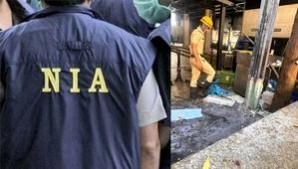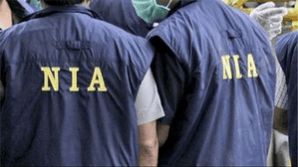
The probe by the National Investigation Agency (NIA) into Bengaluru's Rameshwaram Cafe blast incident has revealed the jailed suspected terrorists' link to Pakistan and global terror outfit ISIS, sources confirmed on Friday.
Sources further stated that NIA found a connection of jailed terror suspects to Pakistan and they also received instructions from Pakistan to carry out subversive activities in India.
The main operative in the cafe blast case is reportedly still missing and is suspected to be in Pakistan, sources confirmed.
The probe has revealed that a group of six persons were involved in the blast case and all of them were connected to ISIS. Among them, four were trained to prepare bombs by ISIS.

Jailed terror suspects in the Bengaluru Cafe blast case Mussavir Hussain Shazib, Abdul Matheen Taha, Maaz Muneer Ahmed and another were trained in preparing bombs. The complete training was given online and in a span of one week, sources stated.
The accused had purchased raw materials online and prepared a bomb in a week. The bombs planted at the Bengaluru Cafe and near BJP headquarters were prepared in a week.
The suspected terrorists would first finalise the place to plant the explosives and then would prepare bombs. They fixed 90-minute timers to bombs, sources said.
Abdul Mateen Taha, one of the terror suspects in the cafe blast case from Thirthahalli, Shivamogga district, had come to Bengaluru in 2012 for engineering studies at Whitefield locality. In the second year, he dropped out, moving to Gurappanapalya. Through the internet, he became involved with jihadist ideologies.
Taha was connected with Shoaib Ahmed Mirza, who was accused in a 2012 targeted killing case and was sentenced to five years of imprisonment by an NIA Special Court. After his release in 2017, Taha met Shoaib again, expressing an interest in joining ISIS.
Taha reportedly contacted the jailed terror suspect Faizal known as Mohammad Shahid Faizal through the dark web, and in 2018, got involved with an organisation called Al Hind Trust, which aimed at radicalising youth.
Taha radicalised his friend Hussain Shazib from Thirthahalli. The two began working for Al Hind Trust, actively recruiting others for the organisation's agenda. In 2020, after a case was registered against Al Hind Trust for alleged terrorist activities, both Taha and Shazib left Bengaluru.
Shazib and Taha planned to set off bombs near BJP offices in Malleshwaram, Bengaluru, on January 22, 2024, coinciding with the Ram Mandir inauguration. The attempt was foiled as the area had a heavy police presence. However, the bomb planted at the BJP office did not explode and was also not found.
After failed attempts in other locations, the suspects decided to target a popular cafe in Bengaluru. Mussavir Hussain Shazib was captured on CCTV entering the cafe on February 29, carrying a bag with an IED set with a 90-minute timer. He left the cafe at 11.55 a.m., and the bomb exploded at 1.07 p.m., injuring several people.
The National Investigation Agency (NIA) on Sept 9 filed a chargesheet against four accused in connection with the blast at the Rameshwaram Cafe that took place on March 1.
Four accused -- Mussavir Hussain Shazib, Abdul Matheen Ahmed Taaha, Maaz Muneer Ahmed and Muzammil Shareef -- have been charged under sections of IPC, Unlawful Activities (Prevention) UA(P) Act, Explosive Substances Act and Prevention of Damage to Public Property Act (PDLP) Act.
"Taaha and Shazib were funded by their handler through cryptocurrencies, which Taaha converted through Faisal with the help of various Telegram-based platforms," the NIA chargesheet read.
The funds were used by the accused to perpetrate various acts of violence in Bengaluru, the investigation further revealed.
All four accused have been arrested, and are currently in judicial custody in connection with the Bengaluru Cafe blast case. The IED explosion, which took place on March 1 this year at the Rameshwaram Cafe in Brookfield, Bengaluru, had left nine persons injured besides causing damage to the interior and infrastructure at the hotel.
(With inputs from IANS)

















